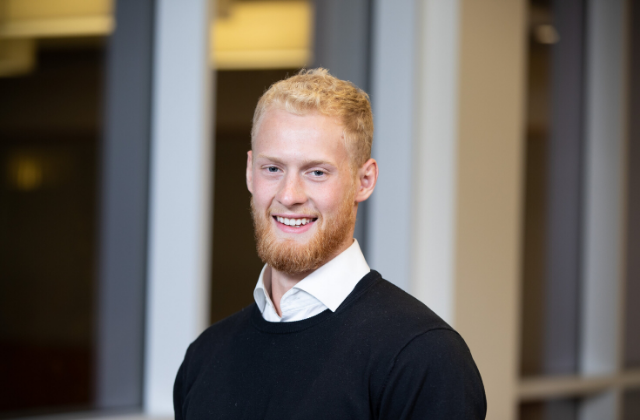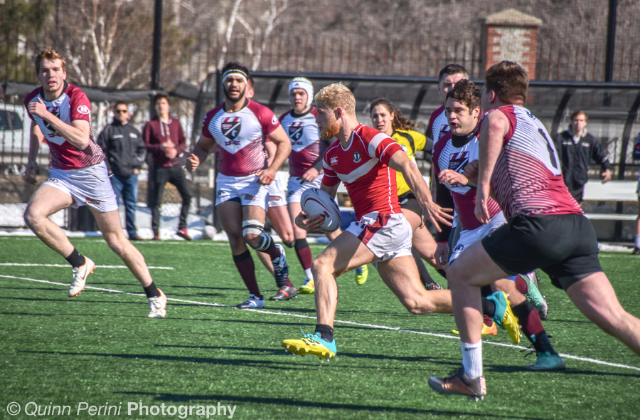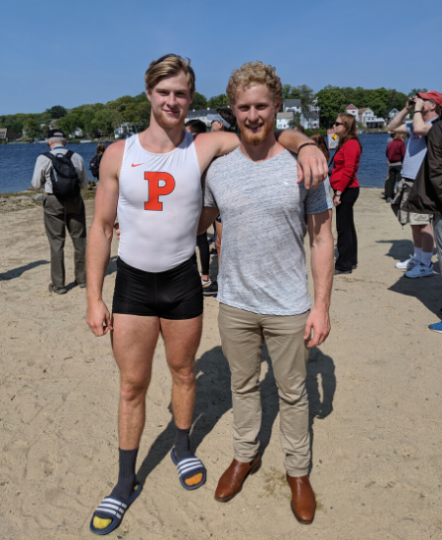Students at Harvard can hone their cross-disciplinary problem-solving skills in the new Undergraduate Technology Innovation Fellows Program, which was jointly launched in 2019 by the John A. Paulson School of Engineering and Applied Sciences (SEAS), Faculty of Arts & Sciences (FAS), and Harvard Business School (HBS).
Supported by the Roberts Family Foundation, the program enables undergraduates to learn problem-solving techniques, provides training in innovation, and helps students develop the ability to work in interdisciplinary teams. The program, which integrates technology and business, includes the opportunity to participate in MBA program electives, monthly seminar sessions, and startup programming.
Sebastian Schwartz, A.B. ’20, a computer science concentrator, shared his experiences as a member of the inaugural cohort.
His interest in entrepreneurship developed through previous experiences with two startups, a payment startup and proton.ai, which delivers intelligent product recommendations to sales teams and previously participated in the Harvard Innovation Labs Venture Incubation Program. He’s found the Tech Innovation Fellows program to be a great way to engage with other students interested in entrepreneurship, as well as faculty and HBS students.
“There’s a mythology of students immediately founding billion-dollar companies, but it’s actually a long learning process. It takes a lot of people around you to mentor you and steer you in the right direction,” said Schwartz.
Schwartz appreciates the community he has found through the program. He has enjoyed getting to know and work with students of a variety of interests and backgrounds in life science, computer science, education, and more.
Schwartz on the rugby pitch, playing for the Harvard Crimson team. (Photo courtesy of Sebastian Schwartz)
“I met a lot of people who are interested in entrepreneurship that I can stay in touch with, including other seniors who are going to similar places after graduation. I’m excited to have met HBS students that I otherwise wouldn’t have a chance to meet,” said Schwartz.
Through the program, Schwartz is working on a startup to help marketers intelligently deliver a unified experience to customers. Broadly interested in statistical modelling and machine learning, he enjoys applying these skills to different areas. He brings these skills to a team that also includes MBA students with a variety of previous work experiences in business, consulting, and health care.
“It’s been a very cool experience to work with older students who are further along in their careers. It’s been very educational to see how they bring that operating experience into conversations,” he said.
Schwartz has conducted interviews with representatives from a range of businesses, from startups to large companies like IBM. He’s found these interviews to be an iterative experience that has helped his team better define their service and improve their ability to help businesses use marketing tools effectively.
For Schwartz, another highlight of the program was the session on Mark43, a public safety software platform. Fellows had the opportunity to talk to Scott Crouch, S.B. ’13 (electrical engineering), the CEO of Mark43, as Thomas Eisenmann, Howard H. Stevenson Professor of Business Administration at HBS, shared a case study on the company.
“The case study presented a specific problem and what could be done to solve it, and Scott was there to talk about it from his experience. It was really cool to hear from a Harvard entrepreneur,” said Schwartz.
Lessons like that have helped Schwartz learn about the qualities that are important for a successful entrepreneur.
“I think it’s important to be really okay with making mistakes because entrepreneurship is a lot of trial and error, figuring things out, and learning to be okay when things don’t work out. When learning in a classroom or a big company, there can be a very obvious direction forward,” he said. “But for an entrepreneur, success might be quite a while away, and that requires some degree of risk appetite. I haven’t really done the proper things that computer science students typically do. Instead, I’ve tried some inherently riskier things.”
Schwartz with his brother, Oliver. (Photo courtesy of Sebastian Schwartz)
In the future, Schwartz intends to pursue his interests in data security and privacy. Before starting a role as a software engineer at Facebook in San Francisco, he plans to spend seven months traveling. Schwartz believes that one needs time to think in order to be creative, and he’s looking forward to brainstorming new ideas as he travels.
Further down the line, he hopes to start a company with his younger brother after his brother graduates from Princeton. Schwartz looks forward to continuing to take risks and apply the skills he’s learned as a part of the Tech Innovation Fellows community.
Press Contact
Adam Zewe | 617-496-5878 | azewe@seas.harvard.edu


